If you have not replaced the water filter on your refrigerator for several months or even years, you might be wondering about when to replace it. Just because the water appears to be fresh, it may not be fresh and may need a filter change. How long does a refrigerator water filter last?
Quick Response
The refrigerator water filters are best changed once every six months. In fact, refrigerator water filters are designed to be one of the most cost-effective means of ensuring that you have the best drinking water possible. It is to be changed at least once every six months for optimum results.
How Long Does a Refrigerator Water Filter Last?
The refrigerator water filter is supposed to be changed once every six months. If your water supply is not contaminated, you may need not need to change it so often. But, the manufacturers generally specify that you need to change the refrigerator water filter once in six months.

How often to replace refrigerator water filters should largely be based on multiple factors. Some water filters on a refrigerator come with the warning lights that specify when you need to change the filter on your fridge. While the manufacturers do specify and recommend you to change the filter once every six months, it may be optional to follow that particular schedule. However, my experience as a water technology professional tells me that you should only leave a refrigerator water filter for a year. The more you continue to use the filter, the more harmful the water is likely to get for consumption.
How Often to Replace the refrigerator water filter?
The time frame that we would recommend for replacing the refrigerator water filter would be around six months – and that is what most of the manufacturers would recommend you to follow. However, you can have your own discretion in changing the water filter on your refrigerators. It would also be dependent on the model and make of your refrigerator.
If you want to benefit from the tests that we have conducted and the inferences that we have been able to draw from them, it is advisable to check out the following parameters to determine whether you need to change the refrigerator water filter or in finding out how often to replace the refrigerator water filter.
Check out the following key indicators to arrive at a possibility
- Does your water supply has an unpleasant and ugly smell?
- Does your filtered water taste the same as the tap water?
- Do you witness any cloudiness in your filtered water?
- Is the water pressure from your refrigerator water weak than it should have been?
If the answer to any of those questions is in YES, you need to replace your refrigerator water filter.
Can You Clean A Refrigerator Water Filter?
There is no definitive answer to whether you need to clean the refrigerator water filter or replace it. If it has been only a couple of months since you have installed the filter, a simple cleaning can help you fix the issues. If you notice the filter has other issues or has crossed more than six months, it is better to replace it.

A few scenarios that would indicate that you should NOT CLEAN the filter would include:
- The water from the filter is cloudy
- The filtered water tastes funny
- The dispenser takes a lot of time to fill a glass of water
- The indicator light is on
- Filter has crossed a lifetime of six months or more
If you decide to clean your refrigerator water filter, here are the steps that can prove to be quite handy:
Step 1: Remove the filter
you should find the refrigerator water filter either on the grille of the fridge at the base, in the upper right-hand corner of the interior, or inside the door. Each of the models may have different positions for the assembly of the water filter. Consult the instruction manual that came with your refrigerator.
You should also find in the instruction manual the steps involved in how to remove the water filter. In most cases, it consists in grabbing the top or sides and turning it anticlockwise to dismantle it.
Step 2: Check if the filter can be cleaned or needs replacement
Once the filter has been removed, you should be able to check it and find if it can be cleaned or needs to be changed. The physical inspection of the filter should give you an idea.
Step 3: Tap the filter
The initial cleaning will involve removing large particles of debris. To do this, tap the filter canister on your trash can or any other surface. This will help you dislodge the large debris. The step will remove the calcification and other deposits.
Step 4: Submerge in warm water
In the next step, submerge the filter in warm water. You can even add a gentle cleansing solution to the water. The mixture of vinegar and mild dish wash soap should also work. You may also buy the solvents specifically manufactured for the water filters.
Step 5: Soak the filter
Soak the filter for 10 to 30 minutes. The time to soak would depend on how soiled the filter is. Rinse it under a gentle stream of water until you notice that the water coming out of the filter is clear.
Step 6: Let the filter dry
Let the filter dry in the air. Pop it back into the refrigerator once it has dried completely
What Are the Benefits of Changing the Refrigerator Water Filter?
There are multiple benefits of changing the refrigerator water filter. First things first, the change of filters would ensure that you have a good experience with the quality of potable water.
Other benefits of changing the refrigerator water filter would include
- You will be eliminating the contaminates and will be able to get cleaner water to drink and cook.
- You will be able to avoid the mineral build-up in the refrigerator.
- Your refrigerator lifespan will increase.
In fact, the drinking water alone should be your prime priority for changing the refrigerator water filter.
Do Refrigerator Water Filters Go Bad?
If you have unused refrigerator water filters, they will never expire if you have stored them in the right way by keeping them away from moisture or excessive heat. It is always recommended to store the refrigerator water filters in the original package. Filters, once used, are bound to expire.
None of the manufacturers that we checked specified any expiry date for the water filters as long as they were stored properly. All of them recommended storing the filters in a cool and dry place. Most of them we found recommending to store them in the original packaging.
However, once in use, the refrigerator water filter can have several factors affecting the service life of the filter. The factors that would affect the exact expiry date of the refrigerator water filter would include the days in use, gallons of water that it would treat, and the quality of water in your water supply system.
What Happens If You Don’t Change the Water Filter in the Refrigerator?
If you fail to change the refrigerator water filter, you run the risk of consuming the water contaminated with the harmful bacteria and chemicals. Each time you get a glass of water from the fridge, you would consume millions of them, affecting your health adversely.
An unchanged water filter can deliver water that is funny to taste and may also be quite smelly. It can also affect the mechanical functions of your refrigerator and thus result in damaging the refrigerator or even necessitating the servicing of your fridge. You would also find that the water dispenser delivers the water very slowly.
How Does a Refrigerator Water Filter Work?
The refrigerator water filter cleans the tap water by tapping and neutralizing the contaminants in the water before it is dispensed to you. The porous material in the refrigerator water filter can help you reduce the impurities by absorbing the contaminants.

Most of the refrigerator water filters come with the sediment and activated carbon filtration. The sediment filter removes the large particles in the water, and the carbon filter clings to the finer particles in a process known as adsorption. About 90% of the chlorine particles are removed when the water passes through the refrigerator water filter.
What Does a Refrigerator Water Filter Remove?
The prime contaminants that the refrigerator water filters can remove would be chlorine, lead, mercury, insecticides, and pesticides. The water filter effectively improves the quality of your potable water.
Here are a few contaminants that refrigerator water filter can remove:
Lead
The lead wasn’t known to be poisonous and was widely used in the manufacturing of paint, pottery, and plumbing pipes until the turn of the 20th century. The later studies found that the lead is extremely toxic and causes severe health issues such as reproductive problems, premature birth, and brain, hearing, heart, and kidney damage.
Chlorine
Chlorine is the major contaminant in the water. In fact, Chlorine is used for disinfecting the water and killing bacteria, viruses, and parasites. But it can ruin the taste and smell of the water used in drinking and cooking.
VOCs
VOC or Volatile organic compounds are the harmful chemicals that are widely used in the manufacturing of paints, pesticides, and pharmaceuticals. The exposure to the VOCs can result in health complications such as eye and throat irritation, liver and kidney damage, nausea, and headaches.
Advantages and Disadvantages of the Refrigerator Water Filters
Having found the benefits that you stand to gain with the refrigerator water filters, let us check out the Pros and Cons offered by the water filters in your refrigerators
- They offer a higher flow rate
- Ease of maintenance
- An excellent convenience level
- Improvement in the taste of water and taste
- It may not be able to remove contaminants such as fluoride, microplastics, arsenic, heavy metals, bacteria, and viruses
- It uses one single filtration stage
- May need a frequent replacement
- Increases the cost of the refrigeration
The Concluding Thoughts
How long do refrigerator water filters last, and how often should you change the water filter? The ideal solution is based on multiple factors, and we recommend choosing the right schedule for cleaning or replacing your refrigerator water filter.

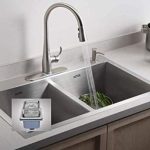
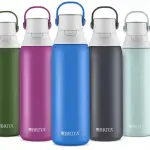
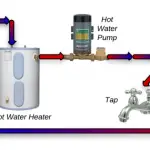
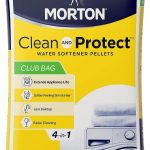
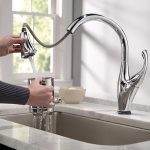





Add Comment